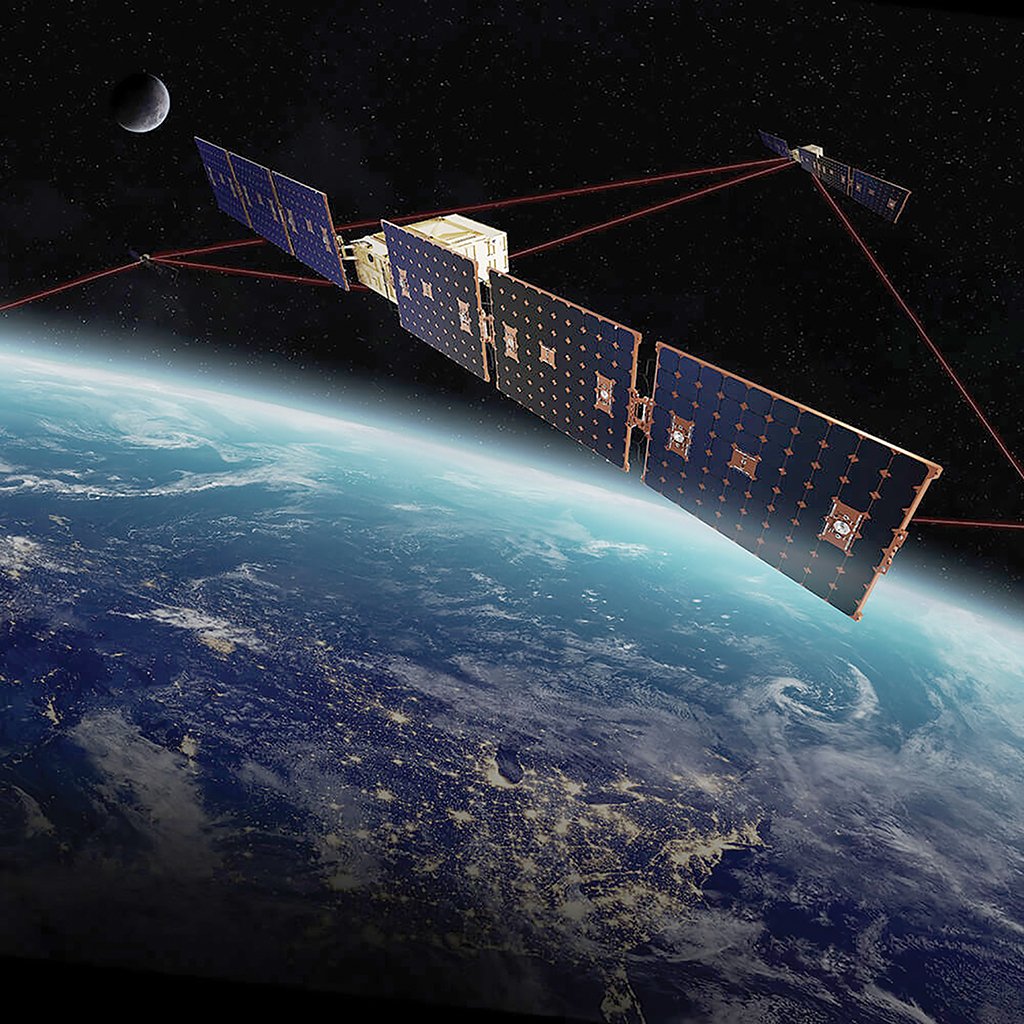
Bell is being criticized for Terran Orbital’s heavy spending, including on a new factory in California.
Terran Orbital, a key supplier for the U.S. Space Force’s missile defense satellites, is facing a cash crunch, delisting from the New York Stock Exchange and an investor revolt.
At the center of the satellite bus manufacturer’s financial turmoil is CEO Marc Bell, whose business background is unusual by industry standards. His prior companies include dot-com-era startup Globix Corp. and Penthouse magazine parent company FriendFinder Networks.
- Key U.S. Space Force satellite component supplier faces financial difficulty
- CEO Bell lacks traditional aerospace and defense background
A “Concerned Investor Group” composed of several prominent former employees alleges that Bell has pushed Terran Orbital to the brink with lavish spending on new factories, robots and dozens of additional products.
While the company’s revenue grew 67% to $104 million for the nine months ended Sept. 30, net losses for the period were $109 million. Long-term debts, some with double-digit interest rates, have grown to $164 million. Cash on hand is tight, falling to about $39 million for the quarter ended Sept. 30 but rebounding to about $70 million as of Dec. 31 thanks to unexplained payments from “key customers.”
Terran Orbital’s share price has also fallen about 93% since its initial public offering (IPO) in March 2022. The New York Stock Exchange (NYSE) is threatening to delist the company within months if its stock price does not stay above $1 a share for 30 trading days.
Critics contend that Bell has champagne tastes on a beer budget. They also see a moment of deja vu: Both Globix and FriendFinder Networks borrowed heavily in pursuit of revenue growth only to end up unprofitable, delisted from public stock exchanges and bankrupt. The Concerned Investor Group is calling for Bell’s resignation.
For his part, the CEO is confident 2024 will be Terran Orbital’s breakout year. “Revenue is on track. We’re doing great,” Bell tells Aviation Week. Net income will be positive by 2025, he asserts.
At the center of Bell’s spending is a vertical integration strategy. “I always believe if you can control your supply chain, you can control your destiny,” he says.
Terran Orbital makes “85% of everything I need,” Bell says. That includes dozens of components such as printed circuit boards, reaction wheels and torque rods. The CEO states that return on investment for some manufacturing equipment is within 12 months.
Even so, the company is looking at expanding to products beyond the space industry by retasking the company’s engineers. “With all that talent sitting around, what else can I build?” Bell asks.
Additionally, Terran Orbital has formed a company to build robotic manufacturing equipment. The venture remains unnamed following a rebuffed attempt to acquire the domain name Skynet, Bell says. “We were going to have a line for robots building robots. That was going to be awesome.”
Amid pressure from investors, the business is exploring “strategic alternatives” that include a potential sale, he acknowledges.
For Bell, the journey to becoming CEO and chairman of Terran Orbital began when he was a child in the 1970s. On one of the last snowy days on record in Florida, his family was stranded in a hotel, where he watched a 24-hr. “Star Trek” marathon. “A Trekkie was born,” he remarks.
The obsession continues. Bell built a 20,000-ft.2 “Star Trek”-themed home in Boca Raton, Florida, including a $1 million home theater modeled to resemble the bridge on the USS Enterprise and including memorabilia such as Leonard Nimoy’s pointy Spock ears. Bell, who often poses for photos making the split-finger Vulcan salute, made Terran Orbital’s stock ticker symbol LLAP: “Live Long and Prosper.”

But before entering the space business, Bell was just a fan. He has a bachelor’s degree in accounting and master’s degree in real estate development. His first company was Bell Technology Group, which went public in 1996. Later renamed Globix, the company owned data centers and a private network of more than 20,000 mi. of fiber-optic cable.
“It’s funny because Globix had, at one time, a $2 stock price,” he says. “I kept telling all my shareholders, ‘It’s just about execution,’ and ‘Be patient.’ We executed; I sold out at $120 a share. Everyone was criticizing me for selling too cheap. We took a company that had a market cap of $20 million and turned it into a market cap of $2.5 billion.”
Bell says he left Globix in March 2000—the month the dot-com bubble burst. The company never recovered. It filed for voluntary bankruptcy protection in March 2002.
Globix’s financial difficulties partly resulted from the Sept. 11, 2001, terrorist attacks, says Bell, as “their main data center was down by [the] World Trade [Center].” He was “completely out” by the time it went bankrupt, he says.
According to Securities and Exchange Commission (SEC) filings, Bell was nonexecutive board chairman, leading the company in and out of voluntary bankruptcy reorganization through 2003.
Bell says he left Globix “to do a whole bunch of other things” including investing in real estate, Broadway productions, restaurants and technology startups. After a long day of work, he consults MarcBell.com to remember it all. One business he does not immediately recall: the 2003 acquisition of Penthouse magazine.
In August 2003, General Media, Penthouse’s parent company, declared bankruptcy amid an onslaught of free internet pornography. “We were literally just creditors,” Bell says, explaining how he had come to own the business. “An insurance company was supposed to pay us off when it came out of bankruptcy.”
According to SEC financial filings, a month after the business declared bankruptcy, Bell and Daniel Staton, who is currently vice chairman of Terran Orbital’s board, formed Pet Capital Partners—an apparent reference to the magazine’s centerfold models, known as “Pets”—to buy Penthouse’s secured notes and preferred stock to acquire the company.
“We couldn’t sell it,” Bell says. “We had to grow our way out of it.”
The company grew revenue rapidly over the next few years to $310 million in 2007 from $130 million, according to a financial filing. Growth was fueled by debt-powered acquisitions of porn industry competitors, including the reported $500 million acquisition of FriendFinder Networks.
By September 2008, the company’s cash had dwindled to $43 million, and its debt soared to $420 million. To pay off loans, the business—which had adopted the FriendFinder brand—sought an IPO, according to SEC filings. However, the bleak winter months of the Great Recession were not a good time to sell stocks to the public. The company aborted its IPO attempt and found ways to keep going for a few more years. It went public in 2011, but losses continued. FriendFinder was delisted from Nasdaq and went bankrupt in 2013.
That was the same year Bell and Anthony Previte—also a former CEO of FriendFinder and chief technology officer of Globix—co-founded Terran Orbital with Previte serving as CEO. The company quickly acquired Tyvak Nano-Satellite Systems, a pioneer in the cubesat industry started by small-satellite standard co-inventor Jordi Puig-Suari.
The Concerned Investor Group, which includes Puig-Suari and two other Tyvak co-founders, declined to comment for this article.
Terran Orbital raised tens of millions of dollars in venture capital over the years. Its prominence rose alongside the cubesat standard as customers, including NASA and the U.S. Defense Department, recognized that shrinkage of electronics made tiny spacecraft increasingly capable.
After Previte died in 2022, Terran Orbital could not find a permanent replacement, says Bell, who served in an interim capacity before telling company leadership: “I’ll do it, but I want to do it my way.”
Bell took the satellite bus manufacturer public via a $255 million merger with a special-purpose acquisition company in 2022. In that same year, Lockheed Martin invested $100 million to become a strategic partner. Terran Orbital supplies buses to the defense prime, including for next-generation Space Development Agency Transport Layer communications satellites and Tracking Layer missile defense satellites.
Lockheed made up 50% and 76% of Terran Orbital’s revenue in 2021 and 2022, respectively. The prime contractor declined to comment on Terran Orbital’s finances or calls for Bell’s resignation.
While business with Lockheed is consistent, at the top of many investors’ minds is the company’s $2.4 billion contract to deliver 300 satellites for Rivada Space Networks’ low-Earth-orbit communications satellite constellation, which it won in February 2023.
But Terran has since walked back expectations on Rivada, stating that work may not generate substantial revenue until 2025. It is also not clear if Rivada has the funding to pay for its satellites.

In May, Terran broke ground on a new 94,195-ft.2 factory in Irvine, California. About a third of the facility’s capacity would be used to fulfill the Rivada order, the company states. Bell predicts it will be “the world’s largest robotic satellite assembly facility.”
“We’re going to get to a point [where] they’re going to have 20,000-40,000 components and models in stock because we’re building them faster than we can use them,” he says.
Would inventory sitting on the shelf tie up precious capital? “I always can get inventory financing,” Bell asserts. “I am very unworried about the throughput of the new facility. It could be over 1,000 buses per year.”
Despite ballooning production capacity, Terran lowered 2023 revenue forecasts to $130 million from $250 million in a November earnings call.
Bell blames previous cash squeezes on an accounting department that was using QuickBooks. The company has since adopted Microsoft Dynamics 365 and better financial modeling, he says.
Terran’s stock price is still bobbing around $0.85 and risks delisting by the NYSE. It breached the $1 mark for a few weeks but fell again on Jan. 8 after a critical report from B. Riley Financial.
“We had a pissing match with B. Riley, and we lost,” Bell says. He blames the negative report on Terran’s decision over the summer to drop a financing deal with B. Riley in favor of another group. “This was their payback.”
Bell does not take criticism lying down. Anonymous Terran Orbital employees who complain about his leadership on Glassdoor.com sometimes receive personal replies from the CEO using the company’s account.
While most of Terran’s employees are in Irvine, where the company maintains its production facilities, its headquarters is in Boca Raton, Florida, where Bell lives. In 2022, the company leased 11,426 ft.2 in an office building he owned, paying him $234,000 in rent, according to an SEC filing.
Bell says he and business partner Staton—also a former executive co-chairman at FriendFinder—have long rented the office space to their companies. “It’s just convenience so we don’t have to pick up and move,” he says, noting that the space houses back-office workers.
In 2022, on top of office lease payments, Terran paid Bell an annual base salary of $995,000. The board approved his maximum performance bonus of 200% of that amount as well, according to an SEC filing.
To those calling for his resignation, Bell replies: “God bless. If somebody can do my job better, as a major shareholder, I will happily step aside.”
The Concerned Investor Group says that although it has identified a “highly credible and qualified” CEO candidate, Bell and the board have ignored its meeting requests. And Bell shows no signs of leaving.
“I’m not doing this for the money,” he states. “I love what I do. I am very passionate about what I do. I am very good at what I do.”






Comments
Bernard Guillaume